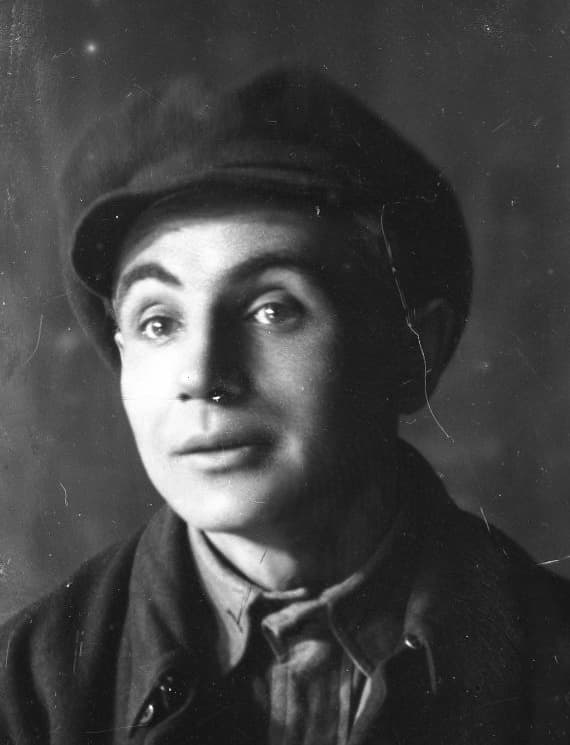Based on the play by Fernand Crommelynck
Translated by O. Steshenko
Premier: October 16, 1926
Director: Les Kurbas
Artist: Vadym Meller
Members of Director’s Lab: Khanan Shmain, Leontii Dubovyk
Sound: V. Kryzhanivskyi
Stage Manager: Oleksandr Savytskyi
Pierre-Auguste – Stepan Shahaida
Muscar, Servant – Yosyp Hirniak
Froumence, Maid, Muscar’s Wife – Nataliia Uzhvii, Klavdiia Pilinska
Barbulesque, Doctor – Marian Krushelnytskyi, Serhii Karpenko
Mayor – Fedir Radchuk
Melina – Valentyna Chystiakova
Prudent – Borys Balaban, Les Podorozhnyi
Frison – Petro Masokha, Mykola Savchenko
Herminie – Nadiia Tytarenko
Scandalmonger – Nataliia Pylypenko
Lelubre – Demyd Babenko
Notary – Mytrofan Kononenko
Actor – Serhii Khodkevych, Mykola Ivaniv
Women – Lidiia Krynytska, Yevheniia Petrova, Antonina Smereka, L. Stanislavska
Girls – Lesia Datsenko, Yaroslava Kosakivna, Kuzmenko, Hanna Lor, Olha Pihulovych
Sergeant – Borys Drobynskyi
Scribes – Mykhailo Zhadanivskyi, Semen Svashenko
Buglers – Voziian, Ivan Havryshko, Andrii Shutenko
Golden Guts, based on the play by Belgian playwright Fernand Crommelynck, was Les Kurbas’s first production after moving the Berezil Theater to Kharkiv, and one that become a loud and painful defeat. Writer Mykola Khvylovyi (a fan of the show, by the way) wrote that it was a show that the audience and theater critics alike were hostile towards.
The Kharkiv audience did not embrace Golden Guts. One paper wrote: “You should have seen the disappointment of the audience, who, based on Kurbas’s statements in the press, thought they were going to see a comedy and instead, to their great disappointment, saw a very boring show.” The author also said that during the performance he attended people left halfway through the second act and the applause at the end was sparse. Writer and theater critic Yurii Smolych, another fan of the show, also used the word “boring,” but not in the context of the show – in the context of Crommelynck’s play: “The director managed to create an impressively colorful theatrical spectacle from Crommelynck’s boring ‘literature.’”
In the play, farmer Pierre-Auguste, in addition to estates and jewelry, inherits two hundred thousand red gold francs, which those around him had passionately hoped to get. The farmer literally ate them out of fear that someone else would get it and died. Auguste died but the gold remained. The audience expected more anecdote than tragedy from the “anecdotal tragedy,” as Khvylovyi put it, and instead it overwhelmed them with bitterness and gloom and raised an issue that the Kharkiv spectator was not ready to think about.
Theater critics always praised the strong casts in Kurbas’s productions. When planning Golden Gut, the director saw Amvrosii Buchma – the theater’s lead actor and his favorite – in the role of Pierre-Auguste. But Buchma let the theater down and stayed in Odesa to star in a film. Kurbas had to make a creative compromise and filled the role with a young, talented, hard-working but inexperienced actor whose acting wasn’t always consistent. The situation was complicated by the fact that the show was put together in a very short time. Yurii Smolych wrote: “Shahaida is a capable performer. He transitions well, but Pierre-Auguste is a very difficult role. The actor hasn’t fully mastered it yet. His performance in the second act, which rests fully on his shoulders, was vague.” In Smolych’s opinion, Hirniak in the role of Muscar and Krushelnytskyi as Barbulesque stood out: “Undoubtedly, these are our greatest actors and masters.”
“The ugly panopticon of greedy contenders for gold (in the words of Yosyp Hirniak) was reminiscent of a George Grosz painting. To emphasize the predatory, bestial and inhuman nature of the characters, Kurbas resorts to poignantly grotesque modes. The director wanted the actors to assume the habits, movements and weaknesses of specific animals, but without an illustrative approach – all these traits were supposed to be suggestive. For example, gold-hungry Auguste (S. Shahaida) was supposed to resemble a hungry boar, the cunning maid Froumence (N. Uzhvii) – a fox, the timid mayor (F. Radchuk) – a frightened hare, the accountant (B. Balaban) – a monkey, the hairdresser (P. Masokha) – a donkey, the group of peasant women – hens.
Theater critic and researcher of Les Kurbas Yurii Boboshko noted: “These weren’t living characters, they were masked images that the director placed in a rather real environment (artist V. Meller), where behind the moving jalousie the interior resembled the Flemish landscape, with its characteristic windmills and outlines of ports deep in the background. Real household items, carefully placed in the hyperbolic show, helped create a feeling of reality.”
The characters appeared and acted on stage based on Kurbas’s own “sound landscape.” The audience heard barking dogs, the sounds of the distant port, the windmill creaking, chickens chirping, pigs oinking, rain and thunder.
The show’s many interesting discoveries made it an important stage in Kurbas’s creative development; nevertheless, the Kharkiv audience was indifferent. As linguist, literature and theater critic Yurii Sheveliov recalled, the play lasted two weeks and the audience numbers decreased with each performance.
Later, after Maklena Grasa, Kurbas’s final production at the Berezil Theater, Yurii Sheveliov, put Golden Gut, despite its failure with the audience, on par with Kurbas’s recognized masterpiece: “Golden Gut was of the same degree of soundness among Kurbas’s Kharkiv works, and to me Kurbas’s path in Kharkiv seems to be a path from Golden Gut to Maklena Grasa, with intermediate stops of high skill, but not perfection.”
Kurbas was always concerned about how the audience would react to a show. He told each of his students: “Never forget for a moment that […] a show doesn’t exist beyond the audience’s perception.”
In 1927, he wrote bitterly: “Golden Gut was a caricature that outlined the theatrical plan that could not be molded under grotesqueness or buffoonery. This comes from a new, non-passive, life-changing setting. And that is why so few, so very few people appreciated Golden Gut.”
Journalist and theater critic Vasyl Khmuryi described the situation with Golden Gut in 1926 with one accurate phrase: “Berezil repeated the words of Tirolt: “It is not always the authors, actors or directors who are defeated – someone it is the audience.”

